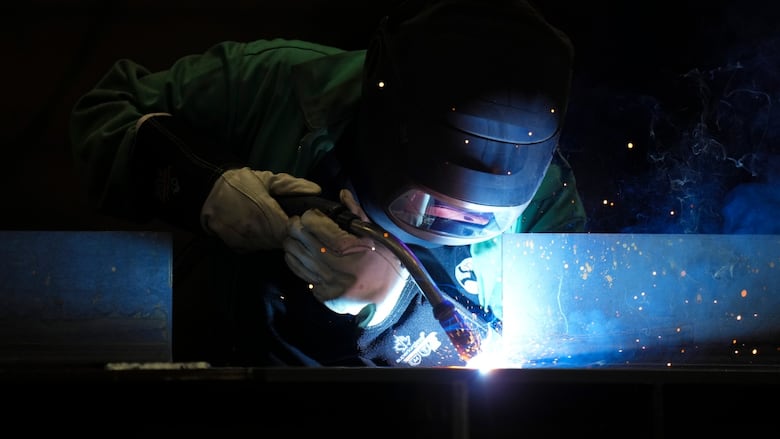Carney promises to curb non-U.S. steel imports as domestic industry signals distress
Industry says there was a 30% drop in production in May

Prime Minister Mark Carney promised to further crack down on the amount of cheap, foreign steel entering the Canadian market by the end of the month, as the domestic industry continues to be clobbered by U.S. President Donald Trump's tariffs.
Carney made the announcement in Hamilton on Wednesday morning, eliciting a sigh of relief from an industry that has already seen layoffs and lower production levels in the weeks since the U.S. imposed steep import taxes.
In June, the government announced changes to the tariff quota system, which allows a set level of product to enter Canada at a lower tariff rate, by limiting steel imports from countries that don't have free trade agreements to 2024 import levels.
But those quotas were criticized by the industry as still being too high. Canadian steelmakers have long alleged that foreign companies are supplying steel to the Canadian market at ultra-low prices, a practice commonly known as dumping, making it hard for them to compete.
Carney said the quota changes "will ensure Canadian steel producers have a bigger share of the Canadian market."
Steel products from non-free trade agreement partners, which include China and Turkey, will see their tariff rate quota tighten to half of 2024 volumes. A 50 per cent tariff will be imposed on any imports beyond those levels, Carney said.
Ottawa is also moving to clamp down on steel from partners who do have free trade agreements with Canada, other than the U.S. and Mexico. The federal government said a 50 per cent tariff will apply to imports surpassing 2024 volumes.
Carney said Canada will implement additional tariffs of 25 per cent on imports from all non-U.S. countries containing steel melted and poured in China.
"Imports supply almost two-thirds of current Canadian consumption of steel, compared to less than one-third for the United States and less than one-sixth for the European Union," Carney said.
Existing arrangements with the Canada-U.S.-Mexico Agreement (CUSMA) will remain the same, he said.
Carney announced no changes to U.S. counter-tariffs as the two countries work toward their Aug. 1 deadline.
Steel association happy with changes
Catherine Cobden, president and CEO of the Canadian Steel Producers Association, said she listened to the announcement "with relief."
"It's certainly a much better place than where we were yesterday," she said of the quota changes.
She said the new caps will help Canadian steelmakers "recapture domestic market."
"I can't sit here and tell you that it will completely offset the loss from the United States, but it will help us," Cobden said.
The industry has been hobbled after Trump first imposed 25 per cent tariffs on the Canadian steel and aluminum sectors in March, citing national security concerns. He hiked the tariffs to 50 per cent in June.
Cobden said there was a 30 per cent drop in steel production in May. Her group is bracing for a further plummet once the numbers reflecting the 50 per cent tariff are available.

Michael Garcia, CEO of Algoma Steel in Sault Ste. Marie, Ont., said the changes are a "step forward."
He said June's tweak to the tariff rate quota left the window "completely open" for countries to offload steel, and Wednesday's announcement will "close that window a little bit."
He said whether Carney's latest move goes far enough will depend on the terms of the Aug. 1 deal.
Carney says deal without some tariffs is unlikely
The announcement comes a day after Carney suggested Canadians may have to accept some tariffs from the U.S.
He did not say how the government will respond if current tariffs remain in place after the August deadline.
Conservative MP Shelby Kramp-Neuman, the party's Canada-U.S. trade critic, called Carney's decision to change the tariff quotas a "step in the right direction."
However, she said a deal with tariffs is "not an option."
"[Carney] ran on not backing down. He ran on the fact that he is going to win, he is the best negotiator," said the Opposition MP for Ontario's Hastings-Lennox and Addington-Tyendinaga riding.
"I recognize that we are in a very strategic pursuit of chess right now, but Conservatives are consistent and steadfast that we want to try and have the best deal for Canada."
Cobden, the steel association head, said her industry is "not interested in a baseline tariff."
Bloc Québécois Leader Yves-François Blanchet accused Carney of backpedalling.
"He has renounced and made compromises on many things so far without achieving anything" he told reporters on Parliament Hill.
While in Hamilton, Carney also announced further investments in Canadian steel companies, including $70 million to provide training and income support for up to 10,000 affected steelworkers and $1 billion through the Strategic Innovation Fund (SIF) to help steel companies advance projects.
The prime minister said Canada's new government will prioritize Canadian steel to build projects including "millions of homes, ports, bridges, energy infrastructure and our security and defence capabilities."
To do that, Carney said changes are coming to the procurement process requiring companies contracting with the federal government to source Canadian steel for government contracts.
With files from J.P. Tasker, Ashley Burke and Raffy Boudjikanian




